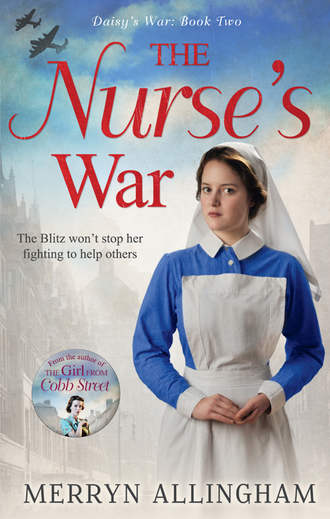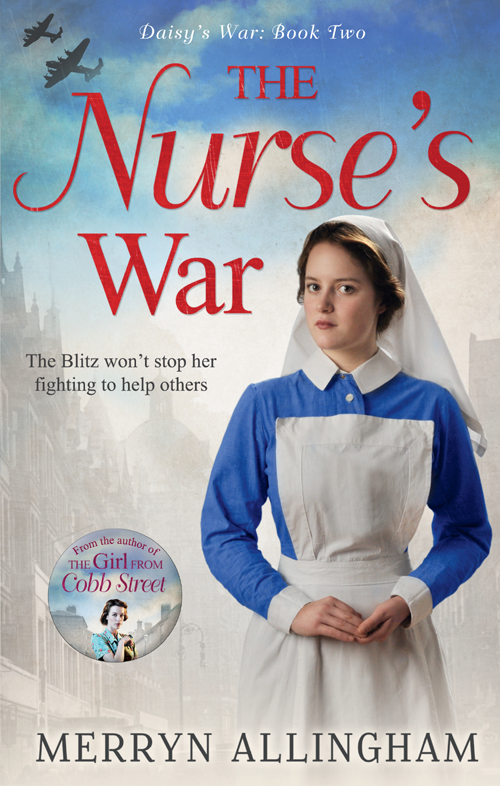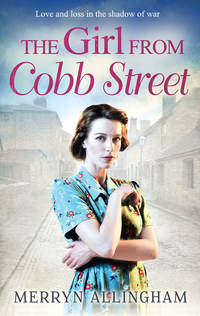
Полная версия
The Nurse's War


MERRYN ALLINGHAM was born into an army family and spent her childhood on the move. Unsurprisingly, it gave her itchy feet and in her twenties she escaped from an unloved secretarial career to work as cabin crew and see the world. The arrival of marriage, children and cats meant a more settled life in the south of England, where she’s lived ever since. It also gave her the opportunity to go back to ‘school’ and eventually teach at university.
Merryn has always loved books that bring the past to life, so when she began writing herself the novels had to be historical. Writing as Isabelle Goddard, she published six Regency romances. Since then, Merryn has set her books in the early twentieth century, a fascinating era that she loves researching. Daisy’s War takes place in India and wartime London during the 1930s and 1940s, and is a trilogy full of intrigue and romance.

Merryn Allingham

To my mother who, with countless other women, fought the war on the Home Front.
‘The past is the present, isn’t it? It’s the future too.’
—Eugene O’Neill, Long Day’s Journey into Night
Table of Contents
Cover
About the Author
Title Page
Dedication
Epigraph
CHAPTER 1
CHAPTER 2
CHAPTER 3
CHAPTER 4
CHAPTER 5
CHAPTER 6
CHAPTER 7
CHAPTER 8
CHAPTER 9
CHAPTER 10
CHAPTER 11
CHAPTER 12
CHAPTER 13
CHAPTER 14
CHAPTER 15
CHAPTER 16
CHAPTER 17
CHAPTER 18
CHAPTER 19
CHAPTER 20
Endpage
Extract
Copyright
CHAPTER 1
London, early April 1941
The footsteps were growing louder. Or at least more distinct in the darkness. Very gradually the sounds of night had fallen away and she had become conscious of the man’s step. She was in no doubt that it was a man. He had an uneven tread, as though he were limping. No, not limping, she thought, but walking uncertainly, as though he feared to give himself away. She had no idea how long he’d been following her, since it wasn’t until she was passing Middle Street that she’d become aware of him. It had been a long and exhausting day and she was almost asleep on her feet. The night shift had come on duty at six as usual, but the wards were full to capacity and she had volunteered to stay on. It meant returning to the Nurses’ Home alone, through the black pall that nightly covered the city.
At first the blackout had come as a severe shock. In an instant, the familiar had been transformed into the frighteningly unfamiliar. But after a while, like most people, she’d adapted. Now with only the slightest trace of moon to light her way, she was confident enough to walk almost blind around dim corners and through murky streets. Until, that is, she’d heard the footsteps. They were there still: left, shuffle, right, shuffle. She felt her shoulders grow tight at the sound and scolded herself for her timidity. They were in the middle of a war and she was falling into panic over a man’s footfall. After all he’d made no attempt to overtake her; in all likelihood he was an innocent, lost in a maze of unrecognisable streets and trying only to battle his way home.
For several minutes she was comforted. But then a thought struck, unbidden and unwelcome. For a stranger to lose his way in these streets would be extremely unusual. The only men she ever encountered at this time of night were there for a purpose. Patrolling wardens with their constant refrain of ‘Put out that light,’ members of the Home Guard who would flash her a greeting with their torches when they caught sight of the nurse’s uniform. This man was alone and surely it wasn’t her imagination that he walked stealthily. Whatever his intentions, she doubted they were benign. The blackout had brought its own troubles and not everyone was doing their bit for King and country.
Out of the darkness a freshness filled the evening air, the freshness of new grass. She must be approaching Charterhouse Square and thanked heaven for it. She was nearly home. In her eagerness to reach safety, she quickened her pace again. The clouds momentarily cleared and through the trees she glimpsed the outline of the Nurses’ Home, its pointed gables floating against the night sky and its large oak door standing sturdily on guard, a portcullis resisting all invaders. She was crossing the square now, fumbling in her bag; she must have her key ready for the minute she reached the door. But the man had increased his pace, too, and she was having almost to run to stay ahead. She fled across the grass, ducking between branches, brushing her way past newly budding leaves. By the time she reached the road on the far side, her heartbeat was drumming in her ears and her breath coming short. She sped across the last few yards of pavement, slowing herself as she reached the iron railings, then quickly up the whitewashed steps, the key clenched in a hand that she couldn’t quite keep steady.
The moon had once more disappeared behind a blanket of cloud and she was forced to feel for the lock. Let me get it right, let me get it right, her mind repeated frantically. The key slotted into the lock and she felt the breath escaping from her body in a sigh of relief. Then, without warning, a hand emerged from the blackness and wrestled the key from her hand. It fell uselessly to the ground, but when she opened her mouth to scream for help, another hand clamped itself to her mouth and stifled the cry.
‘Daisy. It’s me.’ The words hissed through the air.
Her attacker had said her name. But how? And whose was the voice?
‘You’re perfectly safe, but you mustn’t scream. If I take my hand away, promise you won’t.’
It could not be. It could not. She was hallucinating. He was dead. She’d seen with her own eyes his fall into the swollen river. He was dead, he was dead.
‘Promise you won’t make a sound,’ the man repeated. ‘Nod your head.’
It had to be his voice or it was that of his ghost. And she didn’t believe in ghosts. Dumbly she gave a nod and the hands released their hold. She stood not daring to move, her limbs immobile but her chest rising and falling in rapid motion. The figure beside her was searching for something. Then the sound of a match being struck and a small, solitary light flared for an instant. It was sufficient. She had not been hallucinating. The face had changed—the skin was weathered, the face bones gaunt, but it was him. It was Gerald. He had not died in that Indian river. For a moment she was overcome with a sudden nausea as the old guilt broke free of its moorings.
Somehow she managed to find her voice, hoarse and hardly recognisable. ‘Is it really you? I don’t understand.’ How ridiculous that sounded. The understatement of all time.
The memory was so vivid that every one of her senses added a layer to the image. She could still hear the shouts of her captors, feel the hot rain soaking her dress, see the raging waters closing on her husband’s head. How then could he be here? At one violent stroke, the past she had tamed had broken its bonds and was showering her with its fragments. She began to shake uncontrollably and was forced to lean against the massive door for support.
‘It’s me all right.’
‘But how …?’ The question was dredged out of her.
‘I escaped, that’s how. Pure luck.’
‘But how?’
‘My shirt snagged on one of those damned festival floats—would you believe? But it stopped me from going under. I was pulled down the river for miles—you know how fierce the water was. Then the float got pushed into the bank and lodged there.’
‘And you weren’t injured?’
‘A broken arm, that’s all, and it mended pretty quickly. People came from the village to see what had drifted their way and found me instead of the goddess they’d expected. They looked after me until I was fit to leave.’
‘You had an astonishing escape.’ How trite she sounded, but in the face of such extraordinary fortune, what more was there to say? Except there was more. The shock was slowly receding and the questions had begun.
‘But once you were well, once your arm had mended, why didn’t you go back to Jasirapur?’ Why didn’t you face the crime you committed? her inner voice accused. ‘And the—the incident—happened well over a year ago. Where have you been since then? And how did you find me?’
The moon was still in hiding and she couldn’t see his face but she could imagine the irritated expression it wore. Her questions had always annoyed him. He left most of them dangling in the air, choosing only to answer the last.
‘I used my head, Daisy, that’s how. I didn’t know if you were in London, but I thought it worth looking for you.’ What he really meant, she thought, was that he hadn’t known whether she was alive or dead, but that was something he wasn’t going to say.
‘If you had returned to London,’ he continued smoothly, ‘it was possible you’d gone back to Bridges to work. So I called at their perfume counter. You weren’t there, but I had another piece of good fortune. One of the girls you used to work with had seen you. Quite recently too. Her sister was a patient in St Bart’s for a while. She’d just had an operation and when this girl visited, she was sure she’d seen you there. She said you were wearing a nurse’s uniform. So I’ve been hanging around the hospital for a few days hoping to catch you. But no sign. I thought my luck must have run out at last. Tonight when I saw you leave, I’d almost given up.’
‘I’m not always at St Bart’s. Sometimes I have to travel to Hill End. It’s in the countryside, near St Albans. Patients are evacuated there as soon as they’re stable enough.’ She felt stupid—why was she bothering to explain? ‘But what girl at Bridges? And where are you living?’
A chilly breeze sprung out of nowhere, snaking around the corners of the square, and whipping up the edges of her cape. Across the grassed space, the leaves rustled angrily. For an instant, she felt a shadow pass across her vision and blinked in surprise. It made her shiver slightly. She was sure that Gerald had seen it, too, for he shifted uneasily from foot to foot, and his voice when he spoke held the barely contained impatience she had come to know so well.
‘We can’t talk now but I need your help. We must meet—soon—but somewhere else.’ He reached out and gripped her by the arm. It was such a fierce tug that she let out a small cry of pain.
He stepped back and his tone was more conciliatory. ‘I’m sorry. I didn’t mean to hurt but I have to see you. Here—’ and he pushed a piece of paper into her hand. ‘Send your message to this address. It’s a corner shop, one of those that sells just about everything. They’ve agreed to hold post for me.’
Even in her confused state, she found herself pondering why he couldn’t simply give her his address. It would be difficult for her to get to the shop as nursing staff were allowed only a short break during their working day. But she was given no chance to refuse.
‘Don’t let me down, Daisy. Remember, you’re still my wife.’
It was almost a threat, at best emotional blackmail, and from a man who had wronged her dreadfully. She should tell him to go away and never return, leave her to whatever peace she’d found. But old loyalties were not so easily subdued.
‘I’m not sure that I can help.’ At the very least, she must dampen his hopes.
‘You’ve got to. I’ve no one else. My parents are dead. The house they were living in is a pile of rubble, like most of the East End.’
Had what happened in India robbed him of his memory? Where was the story he’d been at pains to impress on her, that his parents had died years ago in the Somerset manor house that was their family home? Years ago, not now, not in wartime, and not in a miserable tenement in the poorest part of the city. But she wouldn’t remind him of the lies he’d told. It was too complicated.
‘I don’t know how I can help,’ she repeated. ‘I’ve no money. I’m a nurse in training and my pay is barely sufficient to buy essentials. I live board free, here in the Nurses’ Home.’
But he wasn’t listening. His own tale, his own needs, were too urgent. He grabbed hold of her arm again. ‘I’m a deserter, Daisy, that’s what it’s come down to. Do you understand what that means? I could be picked up at any time and locked up for years. Do you want to see me go to prison? I have to get away—to a neutral country where they can’t touch me. I have to have papers and you’re my only hope. Send me a message tomorrow with a time and meeting place.’
He turned to go and she was left standing helplessly on the threshhold. At the bottom of the flight of steps, he turned to face her again. ‘By the way, I’m not Gerald Mortimer any more—for obvious reasons. Send your message to Jack Minns. That’s who I’ve become.’
And who you always were, she thought. But he had gone, stealing noiselessly into the soft thickness of the night. She bent down and moved her hand over the stone step trying to locate the dropped key. At last her fingers fastened around it and, with a shaking hand, she managed to slot the key back into the lock and let herself in.
Her room was small and bare, containing nothing more than a narrow bed, a chest of drawers and a desk that had also to serve as a dressing table. But it was her room and hers alone and she was fortunate to have it. Most of the student nurses were forced to share. The Home was always a noisy and boisterous place, reverberating with laughter, with chatter, with music from radios played too loudly. Tonight someone at the end of the corridor was banging on the bathroom door in an effort to gain entrance, someone else was calling to her friend, asking to borrow a hairbrush, a girl two doors down was pleading for quiet to study. Daisy cherished the privacy of her room and this evening it was beyond the price of rubies.
The day had been disastrous. The buses had been late leaving for Hill End and thrown everything else out of kilter. Patients were still in beds they should have left hours before. And then a sudden influx of people suffering severe influenza had made the last few hours chaotic. Barts had been designated a casualty clearing station and most of the medical staff had been transferred to the country hospital. She’d felt honoured to be one of the small number who remained in London to deal with casualties and medical emergencies. But honoured or not, it was gruelling work. For most of last year, London had endured constant bombing and she had seen some terrible injuries. Legs smashed, backs full of broken glass, crushed hands and feet. Injuries that required dedicated nursing alongside the unremitting duties of every student: making beds, emptying bedpans, sluicing foul linen, rolling bandages for the dressings trolley. It was a relentless round of physical labour. And tonight, just when she’d barely been able to keep herself upright from fatigue, this blow had fallen on her. An unbelievable blow.
She threw her respirator into the corner of the room and fell on the bed, still fully dressed. She was tempted to sleep in her uniform, except she couldn’t see how she was ever to sleep that night. Supper had been missed but she hardly cared. A plate of stodgy carbohydrate was the last thing on her mind. She lay looking up at the ceiling, her eyes painfully sore, tracing every crack in the plaster, every smudge in the whitewash, round and round, up and down. Waves of shock, of disbelief, broke over her. Guilt, too, swelled and foamed in their midst. There had always been guilt. Gerald had wronged her but he had also given his life to save her.
Except that he hadn’t. He had lived, and now he was on her doorstep asking for help. She was his wife, he’d said, and she had to aid him. That angered her. She had been no wife in any sense of the word. He’d made sure of that. He hadn’t wanted to marry, had accused her of forcing his hand, and she’d been made aware of his resentment almost every one of the days she had spent with him in India. The bungalow they’d shared had become a prison. Now it suited him to remember there had been a marriage and that she owed him loyalty. But even if she agreed and was willing to help, how on earth could she? He hadn’t listened but she’d told the truth when she’d said that she had no money and no contacts. Nobody who could miraculously produce the papers that would enable him to travel to another country.
She fixed her eyes on the ceiling, following again the cracks as they traced a snaking path from one side of the room to the other. Her mind was roaming to a dangerous place, to the one man who might know how to pull strings. But she would not think of Grayson. She had trained herself not to. She wasn’t sure he could help or that he’d be willing to, and she certainly wasn’t going to ask. Gerald was a deserter and Grayson would take a very dim view of that. In any case, her friendship with him was over, decidedly over. Six months ago he’d taken his dismissal, she’d thought, almost gratefully, and moved on to a new love. No doubt he was already halfway to being married himself.
She uncurled the piece of paper Gerald had pushed into her hand. The address he’d written was a street she knew well, one deep in the East End and near her own birthplace. Near Gerald’s birthplace, too, though he had never admitted it. Until tonight when he’d spoken of his parents. But that was a slip of the tongue, she was sure, brought on by the stress of the moment, and it wouldn’t be repeated. She clambered wearily off the bed and removed her uniform, piece by piece. However distressed she felt, she had to get some sleep. The alarm was set for six o’ clock and tomorrow would be another exhausting day. It was her turn again to accompany a group of patients to St Albans. From early in the morning, the converted ambulances would be waiting in convoy outside, ready to convey to safety those casualties well enough to travel. St Barts had received several direct hits and, though no one had yet been killed, the blasts had been severe enough to blow several nurses across their ward. In comparison Hill House seemed a sanctuary.
She had been asleep barely an hour when a hammering on the door woke her. The Home Sister, Mrs Phillips, was making her way along the corridor, shouting at the nurses to come down immediately. Through the blur of sleep, she heard the unmistakable sound of the siren and in the near distance the drone of planes and the roar of guns massing in unison. Another night raid, another night spent on mattresses in the basement. She wondered why they’d ever complained about the phoney war. Until last May they’d been waiting for the bombs that never came. If only that had continued. Initially, there’d been a flurry of planning. A million burial forms had been issued, the zoo had killed its venomous snakes and London had been emptied of its children. And then the wait for something to happen. At the time it had seemed endless, but when it was finally over, she was left bewildered that they’d wished for anything else. Fifty-seven nights of continuous bombing had reduced London to a state of siege. Then out of the blue, the bombs had ceased. People had begun to relax. They’d lost their tired and haunted look, lost their red-rimmed eyes which told of fear and sleepless nights. But it hadn’t lasted and a few weeks ago, the bombardment had started anew and nerves were once more becoming stretched.
She staggered to her feet, wondering how big the raid was likely to be and whether or not she might make it back to bed that night. She had reached the door when a loud thump the other side made her jump back.
‘You clumsy idiot!’
It was the voice of Lydia Penrose and Daisy had a very good idea of the victim. She opened the door a fraction and saw Lydia picking herself up from the floor, her face an ugly red. A briefcase had disgorged its contents and books and papers lay scattered on the landing.
‘I didn’t push you,’ Willa Jenkins was assuring her colleague. ‘I think you must have caught your foot in the carpet. It’s worn into a hole back there. Look.’ And she pointed behind her to the staircase both girls had just run down.
‘So you’re saying it’s me that’s clumsy!’ Lydia barred the way aggressively, standing with hands on jutting hips. ‘That’s pretty good coming from someone who breaks everything in sight. You can’t have earned a penny since you’ve been here with all the stuff you’ve had to pay for.’
Willa stood her ground. ‘I may have broken a syringe or two, but I didn’t push you.’
‘A syringe or two!’ Lydia snorted. ‘The factory can’t keep up with you, Jenkins, and I distinctly felt your fat little hands in the small of my back.’
For once Willa was proving obstinate. She shook her head, refusing to take the blame.
‘I’m not arguing with rubbish like you,’ Lydia flung at her. ‘You can pick up everything you made me drop.’
When the girl made no move to comply, her tormentor came right up to her and shouted in her face, ‘NOW!’
Even then Willa didn’t immediately do as she’d been ordered and Daisy could see her trying to summon the courage to resist. She knew that feeling. How many times in the orphanage had she tried to fight back and failed? And it was the same for Willa. The girl’s shoulders sagged and she knelt down on the landing and obediently began to heave books and papers into the briefcase.
‘Do it neatly,’ Lydia almost screeched. ‘In the right order. In the order I had them.’
‘I don’t know what that was,’ the girl said miserably.
She was still picking up books when Sister Phillips’ head appeared over the bannister. ‘Get a move on nurses, the raid is almost on us. And that means you, too, Driscoll,’ she scolded, catching sight of Daisy in the doorway.
‘I’m coming, Sister.’ Mrs Phillips was not a woman you disobeyed lightly. She did her job dourly and any nurse who stepped out of line knew she would face a sarcasm that could wither.
But tonight Daisy was willing to risk it. When the senior nurse had disappeared down the stairs followed by her two acolytes, she crept back into her room and shut the door behind her. Tonight she could not bear to be in the company of her fellows, to share the basement’s windowless prison, to lie and listen to the sniffs, the coughs, the fidgeting limbs of a score of bodies, while she longed for forgetfulness. She would stay above ground and hope to sleep once the bombers had passed.
But not yet. The sound of approaching aircraft grew louder. A mad cacophony of guns and bombs burst through the night and assailed the dark, empty streets. With care she lifted the corner of the blackout curtain and squinted through the small square she’d uncovered. She saw immediately that it was another big raid. The sky was laced with light: the beams of searchlight batteries, the stars from bursting shells. A rainbow of colours—green, red, yellow, white—tumbled one over another in endless profusion. Coloured tracers like giant strings of beads winged their way through the sky in search of planes which had no right to be there. Planes that brought death and destruction. Whichever way she looked, from east to west, the night was aglow. Flashes from hundreds of incendiary bombs split the darkness and on the horizon dozens of fires burned, as though they were giant open air furnaces. All around Charterhouse Square, the stone of the buildings was lit with a white glare. Wearily, she let the curtain fall and climbed into bed. She would stay here and take her chances.






